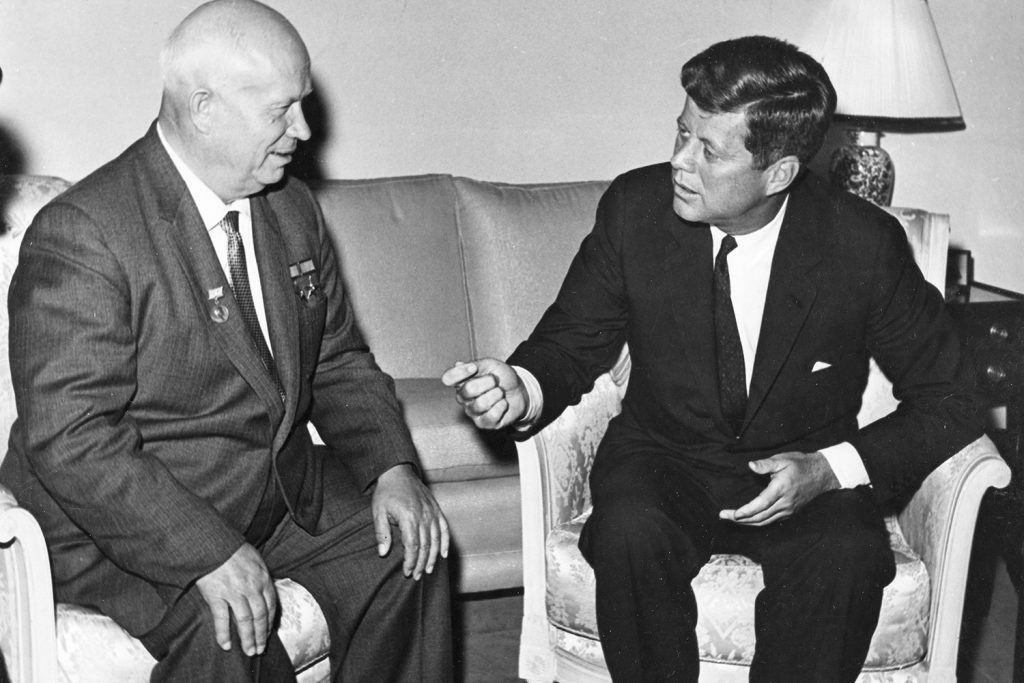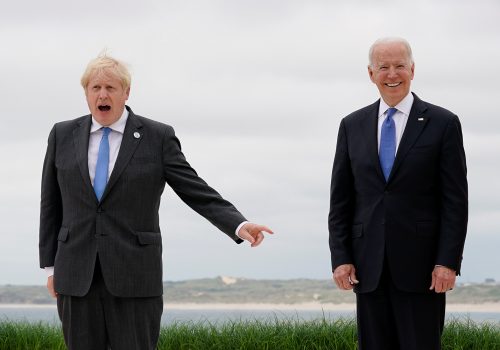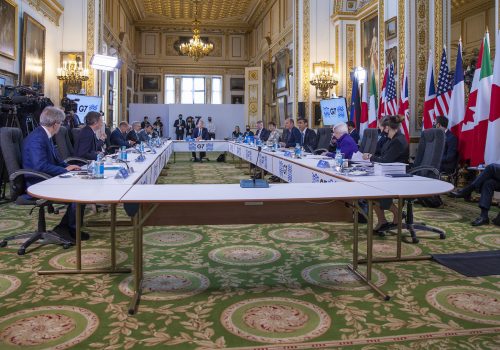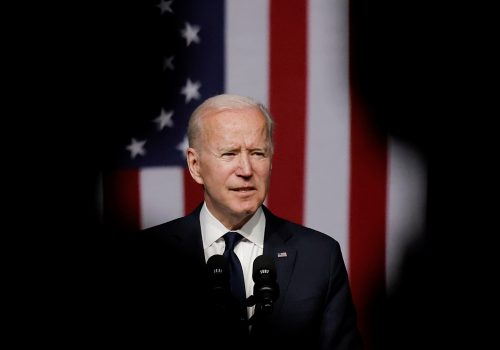Do not expect US President Joe Biden to call attention to the fact that his meeting with Russian President Vladimir Putin on Wednesday in Geneva coincides with the sixtieth anniversary of US President John F. Kennedy’s disastrous Vienna Summit with Kremlin leader Nikita Khrushchev in June 1961.
Yet nothing could provide Biden a more useful warning than the narrative of that two-day meeting, the first such superpower summit of the television era, which I recounted from oral histories and long-classified documents in my book, Berlin 1961: Kennedy, Khrushchev, and the most dangerous place on Earth.
Kennedy’s unwarranted confidence and inadequate preparations, coming to the meeting like Biden when he was just a few months into office, collided with Khrushchev’s ideological determination and brutal rhetorical offensive. Moscow’s leader hammered relentlessly at Kennedy’s resolve to defend US interests in Europe, particularly Berlin, whose freedom had become the Cold War’s defining issue.
Khrushchev came away with an increased conviction that Kennedy was fundamentally weak and indecisive, a view that had been fueled by the failed Bay of Pigs invasion by Cuban exiles just two months earlier, an operation that Kennedy had reluctantly backed and then half-heartedly supported.
Khrushchev also emerged from Vienna confident that he could move to permanently close the open border between East and West Berlin, through which his East German allies were bleeding refugees to the jobs and prosperity of the West. Two months later, East German forces would begin to construct the Berlin Wall with Soviet backing, and it would stand for the next twenty-eight years as the symbol of what unfree systems can impose when free leaders fail to resist.
That, in turn, would be followed a little more than a year later in October 1962 by the Cuban Missile Crisis, perhaps the narrowest escape the United States had from a nuclear war with the Soviet Union. Kennedy had hoped that, by acquiescing to the Berlin Wall’s construction, he could ease tensions with Moscow and advance nuclear weapons talks, but instead Khrushchev’s perception of Kennedy’s weakness convinced him that he could move nuclear weapons within ninety miles of the US border without consequence.
After the Vienna meetings, Kennedy summoned the legendary New York Times journalist James “Scotty” Reston to a private room at the US ambassador’s residence to share with him “the grim picture” and the “seriousness of the situation.”
“Worst thing in my life,” Kennedy told Reston. “He savaged me.”
Kennedy reflected on the resulting dangers. “If he thinks I’m inexperienced and have no guts, until we remove those ideas we won’t get anywhere with him.”
In Reston’s New York Times report, where he protected the confidentiality of his source, he wrote that the president “was astonished by the rigidity and toughness of the Soviet leader.” He wrote that Kennedy left Vienna pessimistic on issues across the board and that he “definitely got the impression that the German question was going to be a very near thing.”
On that, he turned out to be right.
Get the Inflection Points newsletter
Subscribe to Frederick Kempe’s weekly Inflection Points column, which focuses on the global challenges facing the United States and how to best address them.
Lessons from the Kennedy-Khrushchev summit sixty years ago
Fast forward to today, and it would be naïve to conclude that Biden’s far shorter meeting with Putin on Wednesday, even following the collapse of the Soviet Union and of the Warsaw Pact military alliance, is without similar perils.
No doubt Biden’s years of experience dealing with Moscow will help, alongside his sober acknowledgement that Putin is a “killer.” Kennedy came to Vienna at age forty-four and was the youngest president ever elected in the United States, while Biden will arrive in Geneva at age seventy-eight as the oldest.
Yet the dangers rest in the Biden administration’s understandable focus on China as the contest of our times and insufficient realization of the increased challenges Russia poses.
As Michael McFaul, US ambassador to Moscow during the Obama administration, recently wrote in Foreign Affairs, Russia is not “the weak and dilapidated state that it was in the 1990s. It has reemerged… with significantly more military, cyber, economic, and ideological might than most Americans appreciate.”
Wrote McFaul, “Putin has invested heavily in nuclear modernization, while the United States has not. He has also devoted vast resources to upgrading Russian conventional forces.”
Those forces served to rescue the murderous Bashar al-Assad regime in Syria, are poised near the Ukrainian border to do further damage there, and “pose a significant threat to Europe and even outmatch NATO by some measures, including the number of tanks, cruise missiles, and troops on the NATO-Russian border,” McFaul wrote. At the same time, Russian-backed cyber and influence operations against the United States and other Western democracies have escalated.
White House officials have gone to lengths to limit the time Biden and Putin will meet, and Biden will not engage Putin in a joint press conference afterward. They have lowered expectations about deliverables, stressing that it is a leaders’ meeting and not a summit. (One US official has referred to it “more as a cavern,” considering how far relations have sunk.)
Biden, knowing strength is in numbers, has also been wise to precede the Putin meeting by rallying democratic allies, first in his meeting with British Prime Minister Boris Johnson and their signing of a new Atlantic Charter, then with Group of Seven (G7) partners this weekend, and finally with fellow NATO members and then European Union leaders.
In Geneva, Biden has a shot at triggering a strategic stability dialogue that he hopes would produce more predictability in the relationship with Moscow. Officials hope as well for the return to their posts of each country’s ambassador, an easing of restrictions on each other’s diplomatic and consular activities, and the release of one or more Americans being held in Russian prisons.
The most significant test, however, likely won’t be reported until years later by historians studying declassified documents. What will Biden say or not say, do or not do, that will either restrain Putin’s disruptive ambitions or encourage them further?
As Garry Kasparov, Russian chess grandmaster and political activist, wrote in the Wall Street Journal, “History has demonstrated time and again that appeasing a dictator only convinces him you’re too weak to oppose him, provoking further aggression.”
Perhaps that fact, though so much else has changed, is the most powerful link between Vienna sixty years ago and Geneva this week.
This article originally appeared on CNBC.com
Frederick Kempe is president and chief executive officer of the Atlantic Council. You can follow him on Twitter @FredKempe.
THE WEEK’S TOP READS
#1 Crisis of confidence: How Europeans see their place in the world
Susi Dennison and Jana Puglierin | EUROPEAN COUNCIL ON FOREIGN RELATIONS
The European Union (EU) has faced a great number of tests throughout its history, but what set the COVID-19 crisis apart was its existential nature, write Susi Dennison and Jana Puglierin for the European Council on Foreign Relations (ECFR).
The authors examine a range of surveys commissioned by ECFR. They conclude that the EU’s standing with its citizens is more fragile than ever. To save the European project, they argue that its leaders need to strengthen the EU’s place in the world and become more unified in their response to global challenges.
“Europeans cannot afford to forget the values pillar of sovereignty,” they write. “The EU must shape the post-coronavirus world in line with what Europeans think binds them together—a belief in human rights, democracy, and the rule of law.” Read More →
#2 When Biden Meets Putin
Michael Kimmage | FOREIGN AFFAIRS
Michael Kimmage in Foreign Affairs weighs in on what to expect from the meeting between Biden and Putin this week, musing that the two leaders “may know each other too well”—with Biden, then vice president, by his own account telling Putin in 2011 that he lacked a soul.
Kimmage warns that the relationship between the United States and Russia has deteriorated consistently over time and that the two countries “are currently sleepwalking towards the abyss.”
While the major sticking points between Washington and Moscow are likely to last, Kimmage concludes that the Geneva meeting does have a purpose.
“There is real value to the optics of consultation and deliberation,” he writes. “With luck, such optics can evolve into the reality of consultation and deliberation. These are the underpinnings of true stability, and they can keep Russia and the West from getting pulled into a direct confrontation—one that would be as undesirable as it would be undesired.” Read More →
#3 America is Not Ready for a War with China
Michael Beckley | FOREIGN AFFAIRS
Michael Beckley in Foreign Affairs notes that the United States has spent $19 trillion on its military since the Cold War’s end, which is $16 trillion more than China and nearly as much as the rest of the world combined during the same period.
So how can it be that “many analysts and researchers have concluded that if China chose to conquer Taiwan, the Chinese People’s Liberation Army could cripple whatever U.S. forces tried to stand in its way,” as Beckley writes?
Beckley’s conclusion, and one to which the Biden administration must respond, is, “The United States has vast resources and a viable strategy to counter China’s military expansion. Yet the U.S. defense establishment has been slow to adopt this strategy and instead wastes resources on obsolete forces and nonvital missions.” Read More →
#4 A political guide to the European soccer championships
Ishaan Tharoor | THE WASHINGTON POST
The Washington Post’s Ishaan Tharoor turns his gaze to the other geopolitical contest unfolding in Europe this week: the Union of European Football Associations (UEFA) European men’s soccer championships, which Tharoor argues is the sport’s second-most popular tournament after the FIFA World Cup.
Tharoor looks at the political stories beneath the surface that are worth watching. My favorite is the controversy that has emerged over Ukraine’s tournament jersey, which depicts a map of the country that still includes Crimea—the territory Russia annexed in 2014—and bears the nationalist slogans “Glory to Ukraine!” and “Glory to the heroes!”
Russian soccer officials complained, and the UEFA responded. They allowed Ukraine to keep the map given that much of the international community still recognizes Crimea as belonging to Ukraine. That said, the UEFA mandated that Ukraine would have to remove the “Glory to the heroes!” lettering stitched on the shirts’ inside collars. Read More →
#5 The New Atlantic Charter
THE WHITE HOUSE
This week’s must-read is the new Atlantic Charter, signed this week by Biden and Johnson, coming roughly eighty years after Franklin Delano Roosevelt and Winston Churchill signed the original.
The charter is brief and powerful, laying out eight areas in which the two countries agreed to combine forces, “working closely with all partners who share our democratic values” and who wish to counter “the efforts of those who seek to undermine our alliances and institutions.”
The charter reads: “We must ensure that democracies—starting with our own—can deliver on solving the critical challenges of our time. We will champion transparency, uphold the rule of law, and support civil society and independent media. We will also confront injustice and inequality and defend the inherent dignity and human rights of all individuals.” Read More →
Atlantic Council top reads
Image: Former United States President John F. Kennedy meets with Nikita Khrushchev, former chairman of the council of Ministers of the Soviet Union, at the US embassy residence in Vienna, Austria. Photo via REUTERS, Evelyn Lincoln, The White House, and the John F. Kennedy Presidential Library.



